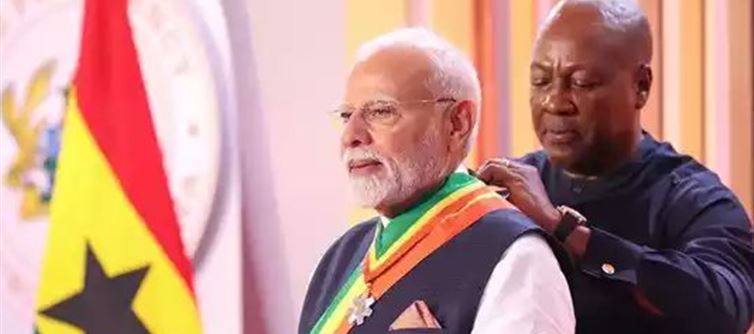
In a significant diplomatic gesture, prime minister Shri narendra modi was conferred with The Officer of the Order of the Star of Ghana, the West African nation’s highest civilian honour, by President john Mahama. This marks Modi’s maiden visit to Ghana, a country once led by the iconic Kwame Nkrumah — a symbol of Pan-Africanism and anti-colonial resistance.
The event, celebrated with much pomp by official indian circles, has ignited a range of responses back home. While the indian government and mainstream media—often dubbed Godi Media by critics—have hailed the moment as a testament to Modi’s global influence and statesmanship, sections of the public and opposition voices have questioned the nature and significance of the award.
“Was it a genuine act of goodwill, or part of a larger deal behind closed doors?” mused one observer, pointing out the opaque diplomatic agreements often tied to such honours. Ghana's decision to bestow the award on a leader perceived by critics as increasingly autocratic has also raised eyebrows among rights groups and democracy advocates.
Regardless of the motivations, the conferment ceremony was an ornate affair, complete with ceremonial guards, state dinners, and media fanfare. Modi expressed gratitude, calling it a “moment of deep honour and friendship between two vibrant democracies.”
For his supporters, this is yet another feather in the cap of a leader who has positioned india as a major player on the global stage. For detractors, it is yet another episode of optics overpowering substance.
As india watches from afar, the symbolism of Ghana—Nkrumah’s Ghana—celebrating a strongman figure may leave many wondering: is it diplomacy, diplomacy-as-performance, or simply a well-scripted spectacle for both nations’ audiences?
Whatever the answer, one thing is certain: Modi’s visit to Ghana, crowned by the Order of the Star, has not gone unnoticed.




 click and follow Indiaherald WhatsApp channel
click and follow Indiaherald WhatsApp channel